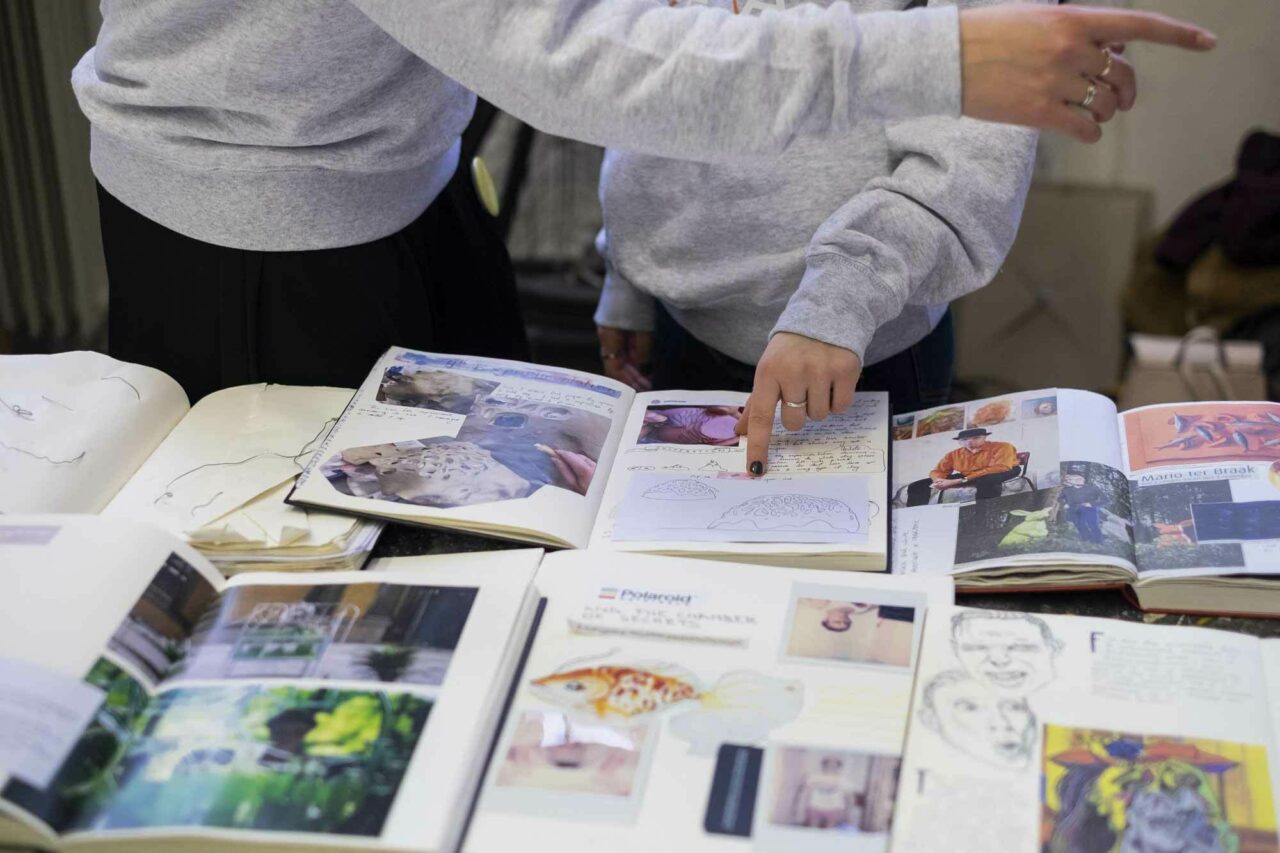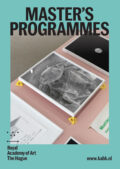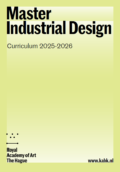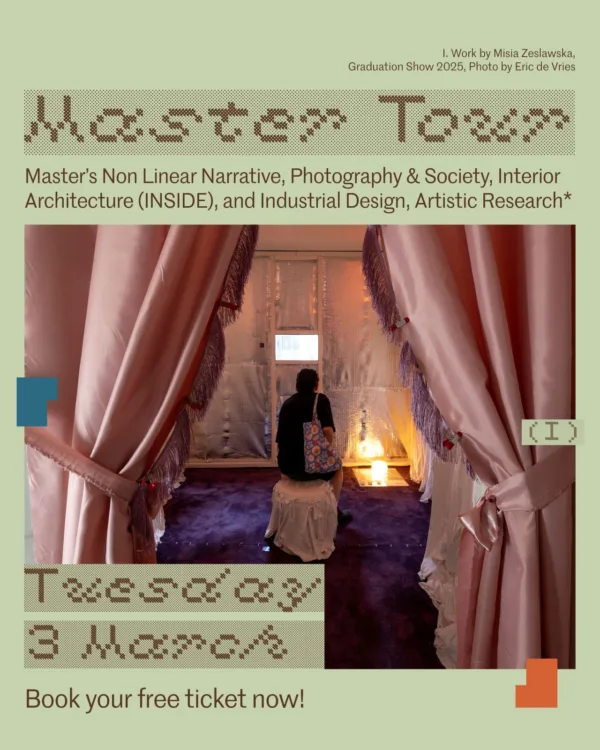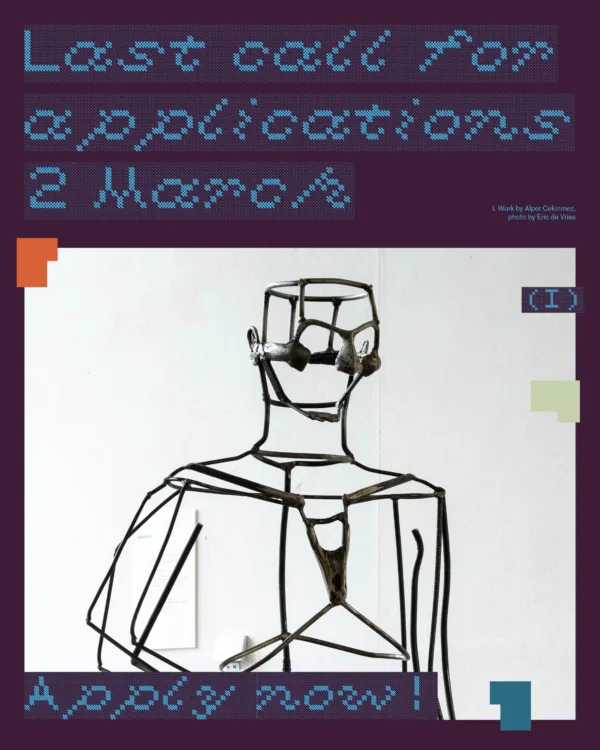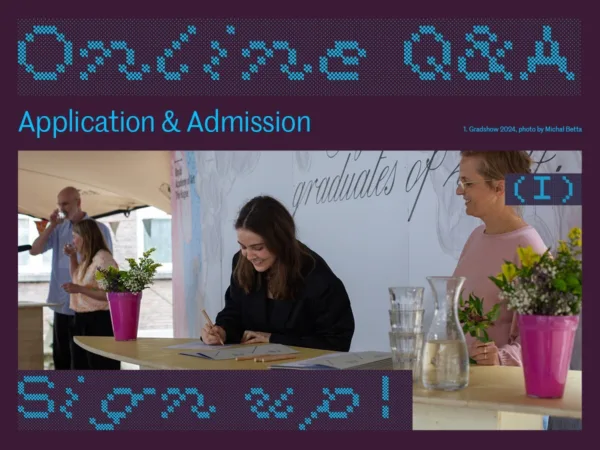Programme description
The two-year English-taught master’s programme is constructed as a matrix of theoretical and practice-led research. Designers are educated to use design as a introspective medium to critically address the various pressing issues of our times. The programme emphasizes individual growth through collaborative-learning, diversifying perspectives, and critical reflection. Design projects, theoretical research, collaborations, seminars, exhibitions, workshops and other peer-learning structures enable students to ask powerful questions, seek their own answers, and design for transformation.
Programme structure
The structure of the programme mirrors the design practice and is therefore project-based.
Each semester of the first year is built around two design projects focused on a common theme. Encircling these projects are classes covering theory, design research, design skills and communication. Guest lectures, master-wide thematic seminars, field trips, workshops, studio visits and collaborations are woven into the programme to enrich the contexts where design and thinking happens.
The Graduation Project (a research based design project) is a year-long endeavor over the course of the two semesters in the second year. During this period, a significant body of work is created, combining individual and collaborative explorations in theory and practice. By incorporating external project-collaborators and organizing research presentations, students gain the ability to position their work against the backdrop of ongoing discourse within and beyond the design field.
The final work is a synthesis of each student's reflexive, conceptual, practical, collaborative and professional abilities, culminating in a graduation show and public presentation of the work.
Courses & ECTS credits 2024-2025
The Master Industrial Design programme amounts to 120 ECTS and lasts two academic years. See below an overview of ECTS credits for the academic year 2024-2025.
| Vakken Semester 1 | ECTS |
|---|---|
| Design Project A 1 | 8 |
| Design Project B 1 | 8 |
| Design Research 1 | 6 |
| Design: Theoretical Framework 1 | 6 |
| Design Skills 1 | 2 |
| Collective 1 | 0 |
| Totaal studiepunten per semester | 30 |
| Vakken Semester 2 | ECTS |
|---|---|
| Design Project A 2 | 8 |
| Design Project B 2 | 8 |
| Design Research 2 | 6 |
| Design: Theoretical Framework 2 | 6 |
| Design Skills 2 | 2 |
| Collective 2 | 0 |
| Totaal studiepunten per semester | 30 |
| Vakken Semester 1 | ECTS |
|---|---|
| Design Research 3 | 30 |
| Collective 3 | 0 |
| Totaal studiepunten per semester | 30 |
| Vakken Semester 2 | ECTS |
|---|---|
| Graduation Project | 30 |
| Totaal studiepunten per semester | 30 |
Inzichten in deze opleiding
Luister naar een gesprek met Stefan, tweedejaars student Master Industrial Design:
Bekijk afstudeerprojecten van afgelopen jaren op graduation.kabk.nl

Guiding principles of the programme
Our current global situation asks for a generation of designers that are able to question the social and ecological relevance of their projects and understand the contexts in which they (want to) operate. We believe our time demands for contemporary designers who are equipped to reflect on and make incisive transformations to our cultural, socio-ecological or material landscapes. The course focuses on educating designers to show great awareness of the world around them, and equip them with the tools to act on their awareness.
We aim to educate designers who celebrate interdisciplinary cross-pollination. The curriculum is built on collaborative projects with partners outside the institute to connect to ‘the real world’, to urgent topics, recent insights, other kinds of knowledge and ways of working. The content of the programme each semester is developed in close teamwork with partners outside the institute.
Ethics and Aesthetics form the two dual pillars upon which an ethical and responsible design practice stands. Designers wield a significant influence over society through the products, structures, spaces, services, systems, narratives and experiences they create. By studying ethics, designers learn to navigate complex socio-political and moral dilemmas they may confront in their professional practices.
Aesthetics pertain to the study of sensory experience, which are often culturally, historically and politically formed. Engaging with aesthetics from a holistic lens allows designers to craft compelling stories that are culturally sensitive and empathetic.
At Master Industrial Design, designers are trained to be sensitive to the narrative power of design. To be mindful of the ideological underpinnings and social boundaries of design practice as it takes shape in different worlds. In a time of immense material and digital saturation, we try to imagine what roles stories can play. We believe in the impact, reach, and transformative potential of great stories—of stories told through design.
Central to every class in the programme is the practice of curating work through individual and group presentations. Curation plays an important role in every step of the design process - from ideation, narration to prototyping and product communication. We look at curation as the visual practice (of communication) of ideas, stories and narratives.
Furthermore, we aim to educate designers who are critical, interesting and respectful partners in dialogue with their colleagues, their public and clients alike.
We believe designers today require the ability to work with and navigate a wide range of discourses, reflect critically on the developments in the design field, reflect on the ethical framework from which they operate, and communicate their work to a wide audience. The course offers an issue-based curriculum, with texts from the fields of humanities including political philosophy, philosophy of technology, archaeology, science fiction, social design and digital cultures. The aim of engaging with texts is to cultivate a culture of reflexive thinking, reasoning, questioning and articulation.
We aim to educate designers who show openness, resilience and persistence in the face of friction, resistance, (conceptual) challenges and critique. There is often no growth without such experiences. We set out to design an educational context in which designers feel safe and challenged to develop themselves (professionally). Offering a learning community in which we perceive students as well as tutoring staff as equal in their learning (ad)venture and openness to share expertise and experience.
Our approach to learning and assessment
The design work you make and present, the discussions you contribute to, and the writing you complete are the ways you will learn. The teaching that supports this progress towards an MA takes seven main forms. These are:
- Regular one-to-one tutorial support with both practice and theory tutors
- Group and peer support are scheduled throughout your study
- Discursive exposure to the work of visiting artists and other specialists. Critical feedback on your own work from these visitors.
- Exposure to a variety of research methods across both science and the humanities. Excursions, workshops and talks with external experts can open up inspiring approaches to design topics.
- Exhibiting, as a finalising stage of research, is explored through public exhibitions. Organising these exhibitions also prepares you professionally through collaboration with external partners.
- Cultural exposure. Group trips expand your knowledge of different artists, resources and situations.
- Assessment. At the end of each semester, your tutors will complete a written assessment of your progress. This will focus on the stated learning goals of the study programme and look back across the semester.
OER 2025-2026
Onderwijs- en Examenregeling
Informatie over de regelingen met betrekking tot de organisatie van het programma en de daarmee samenhangende beoordelingen en examens vind je in de Onderwijs- en Examenregeling (OER)
